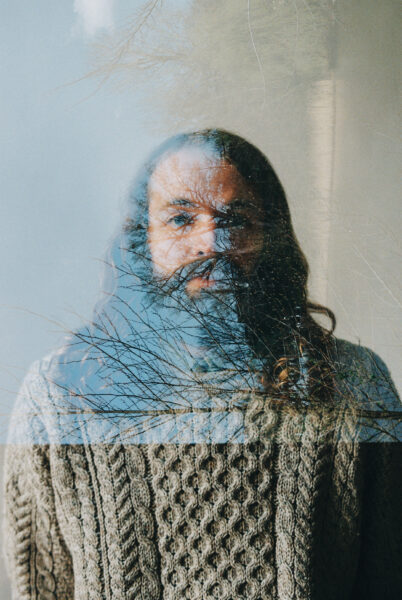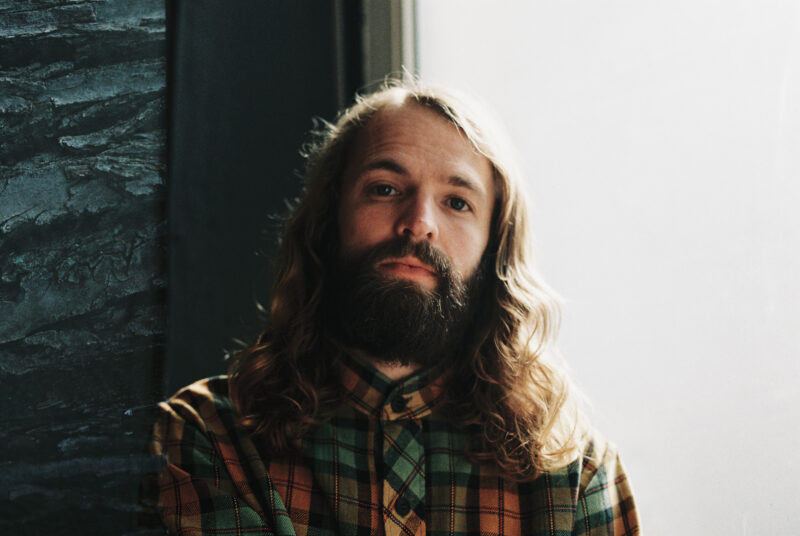Sometimes great stories start with small tales, and if you look at it in retrospect that is also how it went down for Berlin-based singer-songwriter Lucas Laufen in creating his sophomore record Weathering. Well, at least that is the impression I get early on in our interview down at the Guerilla promotion agency in Berlin-Kreuzberg.
“I had this one song written on the piano, Seventy Two, and I always wanted to have some piano on one of my songs. So I actually bought a piano, like a claviano, it’s like a little, maybe a kid’s piano, a practice piano. Anyway, it’s small. I bought it from a guy in Falkensee I think, in Brandenburg, for like fifty bucks or something, for the studio.”
What started with one song and a miniature piano turned out, with the help of Grammy award-winning producer Antonio Pulli, to merge into an exciting new direction for the folk musician, fusing his down-to-earth chamber guitar folk with the neo-classical realm, paying homage to the craft of Hania Rani, Ólafur Arnalds or Nils Frahm.
Mapping Out A New Cosmos
If you think about it, both folk-based songs and the instrumental intimacy of the piano-soothed style have a lot in common, well if you leave out the lyrical root that is. But Lucas Laufen makes a strong case for fusing them together on Weathering:
“The two worlds of instrument folk and the neo-classical are probably closer than you think. Without there being lyrics, you feel the same thing.”
He has a good point though, because isn’t it more about what sentiment words convey and the realms they take you, however poetic they are constructed? Building on the acoustic roots of his 2019 debut I Know Where Silence Lives, the songwriter attains a remarkable momentum of tranquility and ease on his second LP.
“I love this close sound, you get it in the indie-folk world like Sufjan Stevens singing a doubled vocal and they really try to push things closer to your ears. This plus the neo-classical stuff where you also get this vibe when you’re mic-ing piano hammers this far and sometimes you’re playing so softly that you are not even hitting notes and the hammers aren’t hitting. We used this kind of philosophy I guess, everything was played very close to the microphone.”
Although equipped with a background in piano “from when I was eight years old”, the whole creative process did not come without difficulties, as Laufen confesses: “Most of the recording time was probably me learning piano again. It took a long time, trying to relearn and write parts.” But then, the inspiration of the greats of the genre were an essential factor, pushing him into unknown territories.
“I guess Ólafur Arnalds was a huge one I suppose. I spent some time in the Faroe Islands, before my first record and that kind of pushed me into the scene… Through Antonio, Nils Frahm and touring Poland a bit, friends of mine showed me Hania Rani’s music, she is gonna become massive one day.”
And Lucas Laufen is not just toying around with nods to the scene, but goes as far as devoting an entire piece to is newfound creative output. Heaven On The Hill firmly stands at the centre of the record and shines with soothing beauty, echoing the tender quality of Weathering, just relying on the appeal of the keys. Reflecting upon creating this tune, the musician responds:
“This was the big step into that world. We were kind of sitting on that fence with the production and the sound, but then, just step out and put a song out with no lyrics, just close piano in a sense that I placed it there. I thought it would be cool, because it does branch the genre over, you know? And then I am thinking of a whole new world, releasing a record without any lyrics, scoring, reworking some of these songs… I got a billion ideas now without enough time actually. I love that sort of music and want to push into that more. I feel like a bit of a fraud in the sense that I don’t have the instrumental skill to pull it off at the moment. I need to spend two years with a piano to get good, but the ideas are there.”
Songs From A Room
For obvious reasons, the touring routine came to a sudden halt and forced Lucas Laufen to set all his focus on work in the studio, so he “went to building my own studio in Weissensee in Berlin up north. I needed a space to work and a friend of mine, we just built this studio.” Thus, what previously emerged as inspirations from travelling and touring now evolved as a result from being stuck in a strange and restrictive period of time, and songs like Cabin Fever or Time Took Tolls speak volumes of that desperation, not to speak of In Cologne, which was written a few days after the first lockdown in the city.
“I guess, like the last one, it’s just my life really. I write personal songs, it is experiences that I’ve had, it’s nothing made up, it’s just a transfer of something that has happened, or what I’m feeling.”
Eventually, as some amount of going places was possible, “there was a few songs written on trains, the piano song at the end was written up in Scotland, I went up there in December. The title track was written in Poland about two people I know going through anxiety problems. I guess it was a mix of several things”. However, the pandemic did have a massive influence on the creative process, and how could it not?
“I guess it had a huge influence, with the writing as well. I didn’t necessarily want to do that, I feel like my music is, although it’s personal stuff, to get a lot of this out of me. I travel and I go to nature and I get away from people and I think about things in my own environment. And I thought trying to write in lockdown in the middle of a massive city, I just thought, I don’t want to write songs. I was in Berlin the whole time during lockdown. But then of course I’m always just writing, even if you don’t want to write, it comes out eventually. This is how Cabin Fever came out. Actually a lot of the songs on the record probably only exist because of lockdown in the sense that there was no touring either. I wrote a lot of these lines and melodies inside.”
Also, the fact that these songs were basically written for the studio, challenged the songwriter as in preparing to play these songs live for the first time on stages throughout Europe, as he is not short to assert:
“I just recorded them without ever performing them and that’s not something I would ever have done before. As well as the writing the whole production and the quietness even and some of the there because of the situation… now I’m finding it rehearsing it with the band and I’m like ‘oh, I don’t know if I would have made this decisions if I had been playing the songs live’… it is fine if you are just singing them but performing this on stage, it’s like something else entirely.”
Metropolitan Magic?

Photo by Savannah Van Der Niet.
It might be one of the more heart-warming effects of urban culture, all noise aside, that it also brings quieter niches like soothing folk or neo-classical music to the surface. Lucas Laufen, who located here “seven years ago, which feels like ages” out of an inner urge “to get to Europe and live here”, appreciative of Berlin’s “creative spirit”. Upon being asked if these feelings still remain, he says that “it definitely still inspires me… although for me it’s a city to not be locked in too long. It’s a nice city to come back here, but you need to get away as well.”
However, and that is sort of surprising to hear, he is full of praise for the caring community aspect the city is blessed with:
“The scene aspect among folk musicians here in Berlin is just so good! It’s so supportive and there is a network and a community… you talk to a lot of people coming from London and New York or something, saying how competitive it is and here I just haven’t got that at all. Everyone’s lovely and helping. It’s something you wouldn’t expect from Berlin. What I have found that there is definitely pockets of music where folk/ singer-songwriters living here and in indie bands, which is quite similar, it’s a whole other circle of people you don’t know. And then you branch to even further genres, and it’s quite segmented I think.”
Venturing Out
Coming from influential musicians such as Sufjan Stevens, Gregory Alan Isakov or Colour’s Dallas Green, has been going strong breathing own shapes into his folky repertoire and he will likely remain in that realm, but who’s to say he is not going into realms touched on Weathering in some bigger style?
“I’d love to push the neo-classical twist even further… it leads to heaps of other parts, like film music, it’s such an easy to place genre I think.”
After all, even his writing progress has changed through the pandemic era, dividing the lyrical work from composing music, as he tells me in the end: “Previously I would always do it with the music. But then with this record I did write a few poems and this is what the songs became. I guess they always got some sort of melody attached, that’s spinning even if there’s no music, or not too much of a form, when I’m writing them”. Likewise, even when there is just music playing, like the marvellous Heaven On The Hill there is poetry playing, one could easily say. And it is one to watch out for and keep it in your hearts.
Lucas Laufen’s sophomore album Weathering is out now via Embassy Of Music.
Interested in more stories from the world of folk music? Check out all editions of Andreas’ For Folk’s Sake series.



